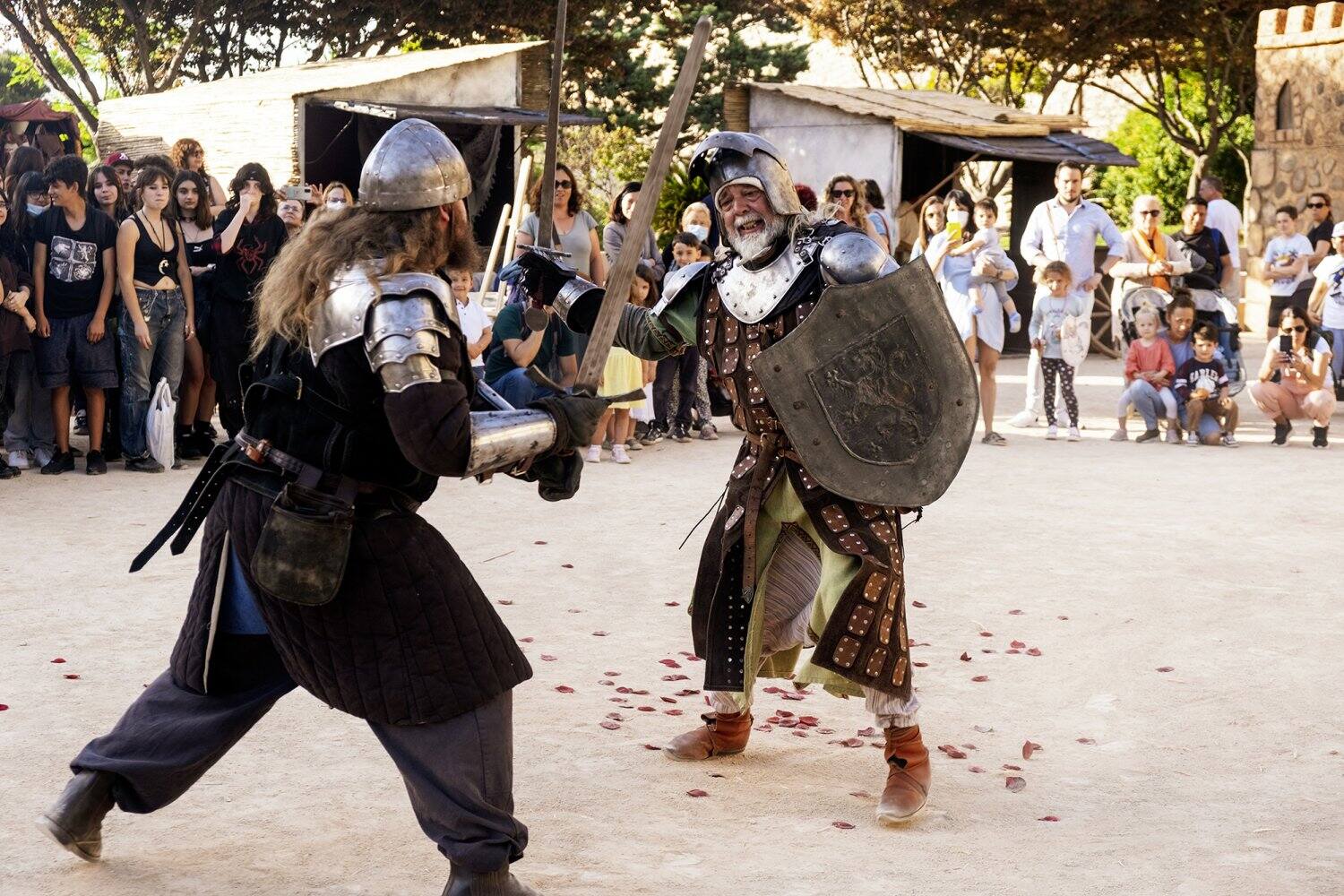
Medieval festivals hold a magical allure, transporting us back in time to a world of knights and maidens, jousting tournaments, and vibrant marketplaces. These events offer a unique opportunity to experience the rich traditions, customs, and entertainment of the Middle Ages. Whether you are a history enthusiast, a lover of fantasy literature, or simply seeking a memorable and immersive experience, medieval festivals have something to offer for everyone.
From the captivating processions to the authentic costumes and mesmerizing music, these festivals aim to recreate the ambiance of the medieval era. In this article, we will delve into 11 fascinating facts about medieval festivals, shedding light on their origins, highlights, and cultural significance. So tighten your corset, polish your armor, and join us as we journey into the enchanting world of medieval festivals.
Key Takeaways:
- Medieval festivals were a big deal in the Middle Ages, with jousting tournaments, historical reenactments, and lots of food and drink. They still happen today and are just as fun!
- At medieval festivals, people dressed up, ate, and had a great time. They were a way for everyone to come together, have fun, and maybe even find love!
Medieval festivals date back to the Middle Ages.
Medieval festivals have a rich history that can be traced back to the Middle Ages, a period that lasted from the 5th to the 15th century in Europe. These festivals were an important part of the social and cultural fabric of medieval society, allowing people to come together to celebrate and participate in various festivities.
Medieval festivals were often held to commemorate religious occasions.
Religion played a significant role in medieval life, and many festivals were organized to celebrate religious events such as Christmas, Easter, and saints’ days. These festivals included elaborate processions, religious ceremonies, and feasts.
Jousting tournaments were a popular attraction at medieval festivals.
Jousting tournaments, where knights would compete in mounted combat, were a major highlight of medieval festivals. These thrilling spectacles drew crowds of spectators who eagerly cheered on their favorite knights in action.
Medieval festivals featured a wide range of entertainment.
From music and dancing to theater performances and acrobatics, medieval festivals provided a plethora of entertainment for attendees. Minstrels, jesters, and troubadours were often present, adding a vibrant and lively atmosphere to the festivities.
Medieval festivals involved reenactments of historical events.
Many medieval festivals incorporated historical reenactments, allowing attendees to witness key moments from the past. These reenactments often portrayed battles, royal processions, and other significant events, providing a unique educational and immersive experience.
Medieval festivals showcased traditional crafts and trades.
At medieval festivals, artisans and craftsmen would demonstrate their skills and showcase traditional crafts and trades. Blacksmiths, weavers, potters, and other skilled individuals would display their craftsmanship, providing insight into the medieval way of life.
Costume play (cosplay) is a popular aspect of modern medieval festivals.
In contemporary medieval festivals, attendees often engage in costume play, also known as cosplay, by dressing up as knights, princesses, wizards, and other medieval characters. This adds an element of fun and creates a vibrant visual spectacle.
Food and drink played a central role in medieval festivals.
Feasting was a significant aspect of medieval festivals, with a wide variety of food and drink being served. Roasted meats, bread, cheeses, and ale were commonly enjoyed, bringing people together to share in the festivities.
Medieval festivals provided opportunities for socializing and matchmaking.
Medieval festivals served as important social events, allowing people from different backgrounds to come together and interact. These festive gatherings often provided opportunities for matchmaking and courtship.
The atmosphere at medieval festivals was filled with merriment and excitement.
Medieval festivals were renowned for their lively and joyful atmosphere. The air was filled with music, laughter, and the excitement of the various activities and events taking place throughout the festivities.
Medieval festivals continue to thrive in modern times.
Despite the passage of time, medieval festivals still captivate people’s imaginations. Today, these festivals continue to be celebrated in various parts of the world, attracting both locals and tourists who want to experience the enchantment of the medieval era.
Conclusion
Medieval festivals are a fascinating glimpse into the past, allowing us to experience the vibrancy and grandeur of the Middle Ages. From jousting tournaments to colorful parades, these events capture the essence of medieval life and culture. Whether you’re a history enthusiast or simply looking for a unique and entertaining experience, attending a medieval festival is sure to transport you to a bygone era. So put on your best medieval attire, grab a turkey leg, and immerse yourself in the magic and excitement of a medieval festival. Don’t miss out on the opportunity to step back in time and make lasting memories!
FAQs
1. What is a medieval festival?
A medieval festival is a cultural event that recreates the atmosphere, activities, and traditions of the Middle Ages. It typically includes elements such as jousting, archery, historical reenactments, live performances, and themed markets.
2. How long do medieval festivals last?
The duration of a medieval festival can vary, but most festivals typically last for a weekend or a few days. Some larger festivals can span over a week, allowing visitors more time to explore all the different activities and attractions.
3. Can I dress up in medieval attire?
Absolutely! It is common and encouraged for attendees to dress up in medieval clothing during these festivals. It adds to the overall atmosphere and allows participants to fully immerse themselves in the experience. Many festivals even hold costume contests for the best-dressed attendees.
4. Are medieval festivals suitable for children?
Yes, many medieval festivals are family-friendly and offer a range of activities suitable for children. From puppet shows and storytelling to interactive games and crafts, there is something to keep everyone entertained.
5. Can I watch a real jousting tournament at a medieval festival?
Indeed! Jousting tournaments are one of the main highlights of medieval festivals. Skilled knights on horseback engage in exciting duels, showcasing their chivalry and horsemanship skills in a thrilling spectacle.
6. Are there food and drinks available at medieval festivals?
Absolutely! Medieval festivals often have a variety of food stalls and vendors offering traditional fare such as roasted meats, hearty stews, bread, and ale. It’s the perfect opportunity to indulge in delicious, rustic cuisine.
7. Can I purchase souvenirs at medieval festivals?
Yes, most medieval festivals have a marketplace where you can find a range of handmade crafts, jewelry, weaponry, and other unique souvenirs. It’s the ideal place to find something special to commemorate your visit.
8. How can I find out about upcoming medieval festivals?
You can search online for upcoming medieval festivals in your area or consider joining local historical and reenactment groups. They often have information about upcoming events and can provide recommendations.
Immerse yourself in history's enchanting embrace by exploring more captivating facts about medieval festivals, Renaissance fairs, and historical reenactments. Journey through time to experience the grandeur of a Renaissance fair, complete with jousting knights and artisans showcasing their crafts. Savor the flavors of a medieval banquet within the walls of a majestic castle, where minstrels' melodies fill the air. Witness history come alive as passionate reenactors meticulously recreate pivotal moments, transporting spectators to bygone eras. Embark on these fascinating adventures and uncover the rich tapestry of our shared past.
Was this page helpful?
Our commitment to delivering trustworthy and engaging content is at the heart of what we do. Each fact on our site is contributed by real users like you, bringing a wealth of diverse insights and information. To ensure the highest standards of accuracy and reliability, our dedicated editors meticulously review each submission. This process guarantees that the facts we share are not only fascinating but also credible. Trust in our commitment to quality and authenticity as you explore and learn with us.


